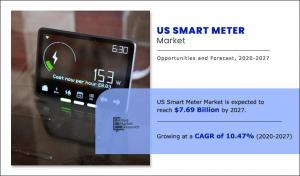U.S. Smart Meter Market Set for Robust Growth: Forecast 2020-2027
U.S. Smart Meter Market Expected to Reach $7.69 Billion By 2027
Development of communication network infrastructure, government initiatives, and high investments in digital electricity infrastructure, etc. boost the U.S. Smart Meter market growth.”
WILMINGTON, DE, UNITED STATES, November 14, 2024 /EINPresswire.com/ -- Allied Market Research, titled, U.S. Smart Meter Market By Component and End Use: Opportunity Analysis and Industry Forecast, 2020–2027”, the U.S. smart meter market size was $3.73 billion in 2019 and is projected to reach $7.69 billion by 2027, to register a CAGR of 10.47% during the forecast period.— Allied Market Research
𝐃𝐨𝐰𝐧𝐥𝐨𝐚𝐝 𝐑𝐞𝐬𝐞𝐚𝐫𝐜𝐡 𝐑𝐞𝐩𝐨𝐫𝐭 𝐒𝐚𝐦𝐩𝐥𝐞 & 𝐓𝐎𝐂: https://www.alliedmarketresearch.com/request-sample/A06772
A smart meter is the next generation of gas, water, and electricity meter that measures how much gas, water, and electricity is being used. A smart water meter measures the water flow and also uses wireless communication to connect to local or wide-area networks that allow remote location monitoring and infrastructure maintenance through leak detection. The smart meter shows digital meter readings and uses a secure smart data network to automatically and wirelessly send readings to energy suppliers at least once a month, so accurate bills are received. In addition, smart meters also come with an in-home display screen, which shows exactly how much energy is used in near real-time.
Smart gas meters are electronic devices that measure gas flows and consumption of gas and provide information on how much gas has been consumed and its relevant costs. Smart gas meters are equipped with shock and leakage detection systems increasing safety to a great extent. Smart gas meter installations help gas companies with some major operational advantages including the elimination of noting monthly readings manually, availability of real-time data, and continuous monitoring of pipelines.
Electric companies are enhancing the resilience and operations of the energy grid and gaining more detailed visibility into system operations that help them restore power more quickly or avoid outages. U.S. electric companies installed 98 million smart meters in 2019, and are cover more than 70% of overall U.S. households. They also install 107 million smart meters by the end of 2020.
𝐆𝐞𝐭 𝐂𝐮𝐬𝐭𝐨𝐦𝐢𝐳𝐞𝐝 𝐑𝐞𝐩𝐨𝐫𝐭𝐬 𝐰𝐢𝐭𝐡 𝐲𝐨𝐮’𝐫𝐞 𝐑𝐞𝐪𝐮𝐢𝐫𝐞𝐦𝐞𝐧𝐭𝐬: https://www.alliedmarketresearch.com/request-for-customization/A06772
𝐂𝐨𝐦𝐩𝐞𝐭𝐢𝐭𝐢𝐯𝐞 𝐀𝐧𝐚𝐥𝐲𝐬𝐢𝐬:
The U.S. Smart Meter industry's key market players adopt various strategies such as product launch, product development, collaboration, partnership, and agreements to influence the market. It includes details about the key players in the market's strengths, product portfolio, market size and share analysis, operational results, and market positioning.
𝐒𝐨𝐦𝐞 𝐨𝐟 𝐭𝐡𝐞 𝐦𝐚𝐣𝐨𝐫 𝐤𝐞𝐲 𝐩𝐥𝐚𝐲𝐞𝐫𝐬 𝐢𝐧 𝐭𝐡𝐞 𝐠𝐥𝐨𝐛𝐚𝐥 𝐔.𝐒. 𝐒𝐦𝐚𝐫𝐭 𝐌𝐞𝐭𝐞𝐫 𝐌𝐚𝐫𝐤𝐞𝐭 𝐢𝐧𝐜𝐥𝐮𝐝𝐞,
ACLARA TECHNOLOGIES LLC.
SCHNEIDER ELECTRIC
LANDIS+GYR
MUELLER SYSTEMS LLC
SENSUS (XYLEM)
SIEMENS AG
ITRON INC.
BADGER METER, INC.
NEPTUNE TECHNOLOGY GROUP INC.
HONEYWELL INTERNATIONAL INC.
The major factor that drives the U.S. smart meter market size includes the development of communication network infrastructure, government initiatives, and high investments in digital electricity infrastructure. However, the high cost of installation of smart meters hamper the market growth of U.S. smart meters. In addition, developing smart city projects in the U.S. are expected to provide opportunities for the U.S. smart meter market growth during the forecast period.
The U.S. Smart meter market is segmented based on component and end-use. The component segment is further sub-segmented into product, service, and connectivity. Based on product, the market is segmented into smart electricity meters, smart water meters, and smart gas meters. Based on service, it is classified into installation and repair & maintenance. Based on connectivity, it is classified into power line communication, cellular communication, and radio frequency. By end use, it is divided into residential, commercial, and industrial.
The U.S. smart meter market trends have been significantly impacted by the COVID-19 outbreak. At the start of the outbreak, the main impact faced by many smart meter manufacturers was supply problems, owing to halted production. Due to lockdown measures, non-essential businesses, and the demand for the residential, commercial, and industrial use of smart meters have decreased. Consequently, the manufacturing and supply of smart meters is returning to normal levels. Several manufacturers have started witnessing a recovery in sales.
𝐈𝐧𝐪𝐮𝐢𝐫𝐲 𝐛𝐞𝐟𝐨𝐫𝐞 𝐁𝐮𝐲𝐢𝐧𝐠: https://www.alliedmarketresearch.com/purchase-enquiry/A06772
𝐊𝐞𝐲 𝐅𝐢𝐧𝐝𝐢𝐧𝐠𝐬 𝐨𝐟 𝐭𝐡𝐞 𝐒𝐭𝐮𝐝𝐲
- In 2019, the electricity meter segment accounted for maximum revenue and is projected to grow at a notable CAGR of 11.3% during the forecast period.
- The residential segment accounted for more than 60.0% of the U.S. smart meter market share in 2019.
- The industrial segment witnessed the highest growth rate during the forecast period.
𝐀𝐛𝐨𝐮𝐭 𝐔𝐬:
Allied Market Research is a top provider of market intelligence that offers reports from leading technology publishers. Our in-depth market assessments in our research reports consider significant technological advancements in the sector. In addition to other areas of expertise, AMR focuses on analyzing high-tech and advanced production systems. We have a team of experts who compile thorough research reports and actively advise leading businesses to enhance their current procedures. Our experts have a wealth of knowledge on the topics they cover. Also, they use a variety of tools and techniques when gathering and analyzing data, including patented data sources.
David Correa
Allied Market Research
+1 800-792-5285
email us here
Visit us on social media:
Facebook
X
Legal Disclaimer:
EIN Presswire provides this news content "as is" without warranty of any kind. We do not accept any responsibility or liability for the accuracy, content, images, videos, licenses, completeness, legality, or reliability of the information contained in this article. If you have any complaints or copyright issues related to this article, kindly contact the author above.

